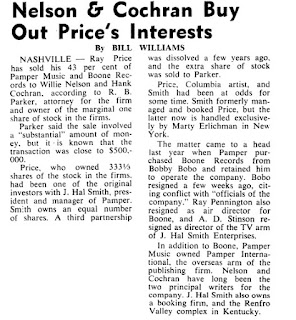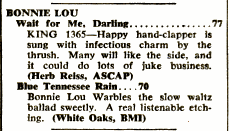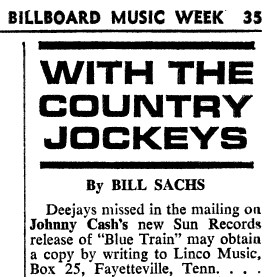Pamper Music and Its Labels
In our little series spotlighting smaller Tennessee based record labels, the New Star and Gaylord labels were a bit different compared to the other companies we have documented. New Star and its sister label Gaylord belonged to Pamper Music, one of Nashville's hottest music publishing firms in the early 1960s. Therefore, this is not only a story about these record labels but also about Pamper as well. Much has been written about Pamper and its staff songwriters like Hank Cochran, Harlan Howard, and Willie Nelson but little attention has been paid to the two labels that were founded to handle not only the publishing rights to songs but also to release the recordings independently. Many future Nashville stars recorded for these outlets but chart success largely eluded both companies.
The Founding of Pamper Music
In order to explore the activities of New Star and Gaylord Records, we have to go back in time to the founding of Pamper Music. The founding date of Pamper is usually given as 1959. Though, the roots of the publishing firm run back to summer 1955. Claude Caviness, a baker from Rivera (now Pico Rivera, Los Angeles), California, and turned record producer, had started his Pep label that year but initially relied on song material for the first two releases that was published by American Music. Caviness' wife, who went by the stage name Marilyn Kaye, was a singer (though not a good one) and Caviness was looking for a hit for her. Ralph Mooney, at that time already a well-known steel guitarist in California's country music scene and acquaintance of Caviness', suggested to establish also a publishing arm to handle original material. In addition, Mooney brought in his compositions "Crazy Arms", which he had written along with befriended songwriter Chuck Seals, as the firm's first work. Caviness took the name Pamper from a shampoo company tube he noticed in a bathroom. Pamper Music was born.
 |
| Billboard May 21, 1955 |
In the summer of 1955, Caviness brought his wife, along with Pep recording artist Kenny Brown and Brown's Arkansas Ramblers in the studio to cut a duet version of "Crazy Arms." Coupled with the Seals composition "Throw a Little Wood in the Fire" as a solo performance by Kenny Brown, the disc appeared in June 1955 on Pep #102. Despite Kaye's limited vocal abilities, "Crazy Arms" gained some airplay, especially on WALT in Tampa, Florida, from DJ Bob Martin. Martin played the song to Ray Price, who in turn recorded the song in 1956 for Columbia and turned it into his first #1 country hit. Many cover versions were cut over the years, including one by Jerry Lee Lewis, who recorded the song at Sun Records for his debut release.
"Crazy Arms" did not only support its writers Ralph Mooney and Chuck Seals with a lifelong financial income but must have also boosted Pamper Music's financial situation. Caviness continued to operate Pep and Pamper out of Rivera and recorded several local artists, including Buck Owens. However, the years 1956-1958 are only sketchy documented. It was probably not until late 1958 that Ray Price and James H. "Hal" Smith, a Nashville based fiddler and booking agent, decided to join the venture. The official founding date is given as January 1, 1959, by Kent Henderson in the CMA's Encyclopedia of Country Music book.
Pamper Moves to Music City, U.S.A.
Hal Smith had played in various bands before, including Roy Acuff's Smoky Mountain Boys and Carl Smith's Tunesmiths (along with his wife Velma, who was a studio musician herself). With Smith and Price being Nashville based, therefore headquarters of Pamper moved to 119 Two Miles Pike in Goodlettsville, twenty miles north of Nashville, where Hal Smith owned a small building. Caviness' own headquarters on 9652 Winchell Street in Rivera served as the company's West Coast office. In 1959, Pamper signed country music singer Hank Cochran to a songwriting contract. Cochran had started his career in 1955 with Eddie Cochran as the Cochran Brothers and was living in California at that time. He moved to Nashville in January 1960 and discovered another young but failing singer-songwriter at the infamous Tootsie's Orchid Lounge: Willie Nelson. The latter presented Pamper with its first Nashville era hit: "Four Walls", recorded by Faron Young. With such additions as Nelson and Harlan Howard to its roster, Pamper developed into Nashville's hottest music publisher in the early 1960s. Cochran and Howard's "I Fall to Pieces", recorded by Patsy Cline, or "Crazy", from the pen of Willie Nelson and also recorded by Cline, became two more chart stormers.
 |
| Billboard December 31, 1960 |
New Star and Gaylord
Soon after Pamper Music took off, the owners decided to expand their activities in the music business by forming their own record labels. Obviously, Caviness' Pep label in Rivera was not considered to be a proper outlet for releasing own productions. Pampers' move to establish labels on their own was clever but by no means was the company the only music publisher in Nashville with this strategy. Acuff-Rose had founded Hickory Records already in the 1950s and such rivals as Cedarwood or Tree would follow the same path. The publishers were eager to gain more control in the recording process, artistically but moreover financially. It is profitable to publish a hit song - but it is even more profitable to put it out on disc on its own.
 |
| Billboard November 3, 1962 |
 |
| Billboard December 15, 1962 |
 |
| Billboard February 9, 1963 |
Ginger Callahan followed up with "A Sinful Soul" b/w "In Love Out of Love" (New Star #6419). Both songs were composed by Callahan and no need to say that they were published by Pamper. New Star released more singles until at least 1969 without much notice from the press, including recordings by such more famous artists as Dave Dudley, Chuck Howard, and David Price, among others. From 1966 onward, steel guitarist Howard White, who had turned to song plugging, promoting and publishing since 1964, was in charge of production for the label.
In contrast to the silent live of New Star, Gaylord Records was created with much more fanfare in late 1962. On November 3, 1962, Jack Maher reported in Billboard that "[...] Pamper Music and its affiliate Gaylord Music have signed a deal with Monument Records to produce and distribute disks. The deal is being negotiated between Pamper-Gaylord topper Hal Smith and Monument President Fred Foster. The label has tentatively been named Gaylord Records and first product will probably be issued around the first of the year. [...]"
The first release on Gaylord appeared (contrary to what was written in above mentioned Billboard article) already in November 1962 by Linda Manning, "Johnny Kiss and Tell" b/w "Thanks a Lot for Everything" (Gaylord #6425). The disc was reviewed by both Billboard and Cash Box in December but was not mentioned in the various reports that Billboard carried in late 1962 and early 1963. This honor went to Hank Cochran's "Yesterday's Memories" b/w "When You Gotta Go (You Gotta Go)" (Gaylord #6426), which was announced in Billboard's February 9 issue to hit the store shelves around February 15, 1963.
 |
| Billboard April 16, 1966 |
During the years 1963 and 1964, recordings by Manning, Cochran, and David Price and others appeared on Gaylord. Rusty York's rendition of "Sally Was a Good Old Girl", written by Harlan Howard of Pamper, was released on both New Star and Gaylord. Billboard reported on this issue: "Pamper Music's Hal Smith, who also operates Gaylord Records, Monument affiliate, has acquired the Rusty York master on Newstar label of 'Sally Was a Good Old Girl'. It was released this week through Monument." This brings me to the question if New Star was a Pamper affiliate at all? Nevertheless, it would be too coincidental that all New Star releases carried song material published by Pamper, shared the same numerical system as Gaylord for some time, and was located in Goodlettsville.
Claude Caviness left Pamper in the mid 1960s, which caused the company to lose its West Coast office. As a replacement, Hal Smith worked out an agreement with Joe Allison from Los Angeles, also owner of his own publishing firm Nashville Music (although much smaller than Pamper at that time), and new offices were opened in April 1966.
The End of New Star and Gaylord
The high hopes never materialized into record sales, at least almost none of the issued discs on New Star or Gaylord reached Billboard's C&W charts. The only one hitting the charts was Hank Cochran's "A Good Country Song" (Gaylord #6431, #25) in 1963.
In the spring of 1968, another of Pamper's original founders turned his back on the company. Ray Price sold his 43 percent of shares to the company's staff writers Willie Nelson and Hank Cochran. Also remaining with Pamper were Hal Smith and R.B. Parker, the latter being the attorney for the company. Apart from New Star and Gaylord, Pamper had acquired Bobby Bobo's Boone record label out of Union, Kentucky, in 1968. Boone released discs until summer 1969.
 |
| Billboard April 13, 1968 |
While Gaylord was already discontinued in late 1963 or 1964, New Star Records kept on releasing discs until 1970. By then, Pamper had been taken over by Tree International Publishing, losing its independence in April 1969. New Star's last few releases were produced already under Tree's ownership and supervision. With Tree acquiring Pamper, all compositions went over into Tree's catalog and are now part of Sony/ATV.
In the 1980s, Hal Smith sold the property at 119 Two Miles Pike. The building was subsequently used as an animal hospital but was demolished in 1994 in favor of a new building for the hospital that suited the purpose better. Shortly before, Hank Cochran acquired the gear out of the building's garage, in which Willie Nelson had written one of Pamper's top hits, "Hello Walls". Nelson had recorded a slew of demos of his songs while signed to Pamper. These tapes were finally released in 2018 on a CD entitled "The Pamper Demos".
Many of the key figures of Pamper/Gaylord/New Star have already passed away, so it is difficult to document the history of these companies in detail. Hal Smith died September 2008 at age 84. Hank Cochran followed in 2010 and Ray Price in 2013. Claude Caviness is probably no longer with us, too, although details escape us on this issue. The only surviving person would be Willie Nelson. So, Willie, or anyone else out there who worked with Pamper, share your memories with us!
• Country Music Hall of Fame: The Encyclopdia of Country Music (Oxford University Press, 2012), page 403
• Michael Kosser: How Nashville Became Music City, U.S.A. (Hal Leonard, 2006), pages 71-74


















